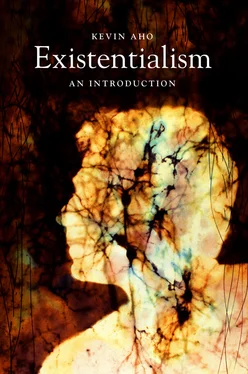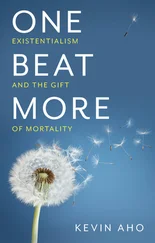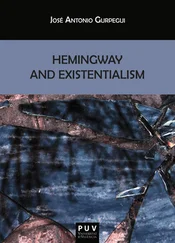Kevin Aho - Existentialism - An Introduction
Здесь есть возможность читать онлайн «Kevin Aho - Existentialism - An Introduction» весь текст электронной книги совершенно бесплатно (целиком полную версию без сокращений). В некоторых случаях можно слушать аудио, скачать через торрент в формате fb2 и присутствует краткое содержание. Год выпуска: 2013, ISBN: 2013, Издательство: Polity, Жанр: Философия, на английском языке. Описание произведения, (предисловие) а так же отзывы посетителей доступны на портале библиотеки ЛибКат.
- Название:Existentialism: An Introduction
- Автор:
- Издательство:Polity
- Жанр:
- Год:2013
- ISBN:978-0745651422
- Рейтинг книги:3 / 5. Голосов: 1
-
Избранное:Добавить в избранное
- Отзывы:
-
Ваша оценка:
- 60
- 1
- 2
- 3
- 4
- 5
Existentialism: An Introduction: краткое содержание, описание и аннотация
Предлагаем к чтению аннотацию, описание, краткое содержание или предисловие (зависит от того, что написал сам автор книги «Existentialism: An Introduction»). Если вы не нашли необходимую информацию о книге — напишите в комментариях, мы постараемся отыскать её.
Existentialism: An Introduction
Existentialism: An Introduction — читать онлайн бесплатно полную книгу (весь текст) целиком
Ниже представлен текст книги, разбитый по страницам. Система сохранения места последней прочитанной страницы, позволяет с удобством читать онлайн бесплатно книгу «Existentialism: An Introduction», без необходимости каждый раз заново искать на чём Вы остановились. Поставьте закладку, и сможете в любой момент перейти на страницу, на которой закончили чтение.
Интервал:
Закладка:
On the existentialist view, the human situation cannot be grasped through detached reason. It is grasped primarily through penetrating emotions or moods that bring us face-to-face with our existence and the concrete choices and actions that define us. This is one of the reasons why existentialists reject the classical configuration of the human being as a rational animal. As Unamuno writes, “Man is said to be a reasoning animal. I do not know why he has not been defined as an affective or feeling animal. Perhaps that which differentiates him from other animals is feeling rather than reason” (1954, 3, my emphasis). It is in the unique way that we feel and suffer in confronting our own situation that distinguishes us as human beings, and the more intensely aware of our situation we become, that is, the more intensely we feel it, the more we suffer. To be sure, existentialists are still concerned with issues of truth and knowledge, but knowledge of what it means to be human. They reject the standpoint of methodological detachment because it is removed from the concrete feelings and concerns of the existing individual. On their view, knowledge of human existence begins from inside one's own situation and the affective commitments and values that matter to the individual. It is a truth that cannot be thought; it can only be felt with intensity and passion. We can get a sense of what this means by turning to Kierkegaard's conception of subjective truth.
Subjective truth
Kierkegaard's critique of rational detachment and objectivity is directed primarily at G. W. F. Hegel (1770–1831), whose aim was to construct a vast metaphysical system that would provide absolute knowledge of reality. In his first and most important systematic work The Phenomenology of Spirit (1807), Hegel offers a panoptic account of Western consciousness as a dialectical process shaped by opposing principles — such as subject/object, freedom/determinism, temporal/eternal, and particular/universal. The tension between these oppositions is resolved through the rational mediation of history itself. Hegel's system is understood as ‘Absolute Idealism’ because it holds that all of reality is shaped by ‘mind’ or ‘spirit’ ( Geist ), where spirit is not interpreted in terms of a singular individual but as a shared historical spirit. By describing earlier stages of spirit, Hegel shows how consciousness is evolving from non-conceptual knowledge derived from naïve sense perception, to more advanced conceptual forms of knowledge that are mediated through rational reflection and are, therefore, more universal and abstract. This dialectical process eventually culminates in the final stage of Absolute knowledge. At this stage consciousness becomes self-consciousness as we realize that all previous forms of knowledge are produced by and belong to the dialectic unfolding of consciousness itself. And the various modes of thought and experience that have emerged in the progressive stages of history are grasped as part of the long painful process of self-recognition. This rational culmination resolves the dichotomies and conceptual tensions that plague earlier developmental stages.
Although he was indebted to Hegel's interpretation of the human condition as a dialectical tension, Kierkegaard believed this tension could never be resolved through rational mediation but only through the passionate commitments of the existing individual. In his Concluding Unscientific Postscript , Kierkegaard describes how Hegel's universalizing system requires taking the ‘perspective of eternity,’ and how this detached standpoint invariably cuts the philosopher away from existence, from the finite and temporal needs of the individual. Referring to Hegel sarcastically as ‘Herr Professor,’ he writes:
Can the principle of mediation … help the existing individual while still remaining in existence himself to become the mediating principle, which is sub specie aeterni , whereas the poor existing individual is confined to the strait-jacket of existence? … How can it help to explain to a man how the eternal truth is to be understood eternally, when the supposed user of the explanation is prevented from so understanding it through being an existing individual, and merely becomes fantastic when he imagines himself to be sub specie aeternitatis ? What such a man needs instead is precisely an explanation of how the eternal truth is to be understood in determinations of time by one, who is existing, is himself in time, which even the worshipful Herr Professor concedes, if not always, at least once a quarter when he draws his salary. (1941, 171–772)
Because it is detached from the flesh and blood particulars of individual existence for the sake of abstraction and objectivity, Kierkegaard describes Hegel's project as one that represents “an age [that] has forsaken the individual in order to take refuge in the Collective Idea” (318). He responds to Hegel and the entire Western philosophical tradition when he argues that dispassionate theorizing invariably “makes the subject accidental,” turning it into “something indifferent, something vanishing” (173).
For Kierkegaard, abstract philosophy never engages one's own subjective truth, that is, “ the highest truth attainable for an existing individual ” (182). Of course, subjective truth cannot give me absolute knowledge about the nature of reality, but it is more fundamental because it gives me knowledge about who I am and how I should live my life. In this sense, Kierkegaard's view echoes the ancient Greek aphorism: “One must know oneself before knowing anything else” (1959, 46). In this light, he offers what is perhaps the most definitive statement in all of existentialist philosophy.
What I really lack is to be clear in my mind what I am to do , not what I am to know. … The thing is to understand myself, to see what God really wishes me to do; the thing is to find a truth which is true for me , to find the idea for which I can live and die . (44)
With these lines, Kierkegaard illuminates how objective truths are not my own because, to the extent that they are universal and abstract, they ignore the concrete and particular concerns that matter to me, that tell me what I should do with my life. And for Kierkegaard, it is only by committing to my own subjective truth that I can “ lead a complete human life ” (45), and this commitment can never be grasped through appeals to disinterested reason because it is constituted by my own singular experiences, emotions, and needs.
Interpreting truth this way allows Kierkegaard to undermine the traditional view of the self as a disinterested mind or ‘cogito.’ This is because prior to detached reflection, I exist , that is, I am already choosing a particular kind of life and carrying the burden of responsibility in becoming the person that I am. Thus, “the real subject,” says Kierkegaard, “is not the cognitive subject … the real subject is the ethically existing subject” (1941, 281). Given this account, my existential commitments are always prior to thought or reason. After all, “I must [first] exist in order to think” (294). On this view, whether a belief is rational or objectively true is irrelevant. What matters is the intensity and passion of my commitments because they alone belong to my existence. But for Kierkegaard, this exposes the “paradoxical character” of subjective truth (183); it is a truth grounded in anguish because it is objectively uncertain and unintelligible to others.
In privileging subjective truth, Kierkegaard captures two of the central themes in existentialism. First, to follow one's own truth may require suspending one's universal duty to others. As we will see in more detail in chapter 6, we are all confronted with painful, life-defining moments when we have to choose between being true to objective moral laws or being true to oneself . For the existentialists, it is only the latter choice that manifests ‘ the highest truth attainable .’ Second, Kierkegaard shows how theoretical detachment cannot give us access to our own truth. The truth of one's own existence is not thought but felt in penetrating emotional experiences of dread and anguish. These truths are dreadful because they have no objective or rational justification and are, therefore, incomprehensible to others. No one else can understand the commitments that matter to me as an individual. It is important to note, however, that this position does not make Kierkegaard an ‘irrationalist.’ It shows, rather, that rationality and objectivity are only a part of what it means to be human, but when it comes to one's own concrete concerns, it is of little or no use. Subjective truths cannot be reasoned about; they must be lived . This idea, that the ‘highest truths’ emerge out of the situated concerns of the individual, is further developed by Nietzsche, who radicalizes Kierkegaard by rejecting the notion of objective truth altogether and suggesting that all we have access to is our own finite and limited ‘ perspective ,’ and there is no way to detach or to step outside of it.
Читать дальшеИнтервал:
Закладка:
Похожие книги на «Existentialism: An Introduction»
Представляем Вашему вниманию похожие книги на «Existentialism: An Introduction» списком для выбора. Мы отобрали схожую по названию и смыслу литературу в надежде предоставить читателям больше вариантов отыскать новые, интересные, ещё непрочитанные произведения.
Обсуждение, отзывы о книге «Existentialism: An Introduction» и просто собственные мнения читателей. Оставьте ваши комментарии, напишите, что Вы думаете о произведении, его смысле или главных героях. Укажите что конкретно понравилось, а что нет, и почему Вы так считаете.












